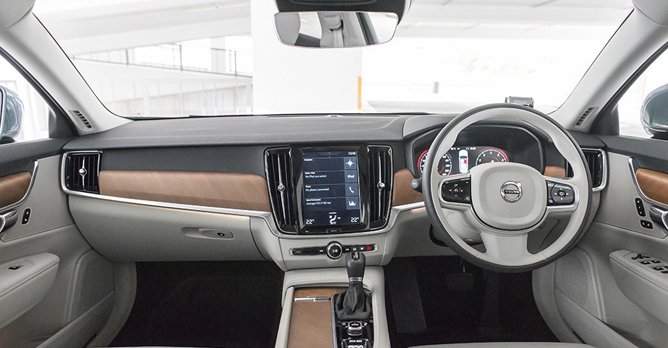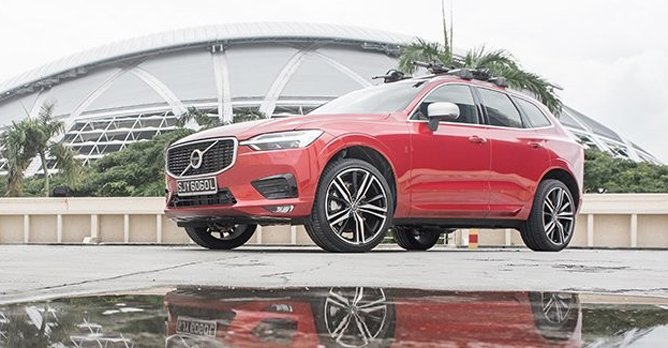Volvo starts selling its China-made models here
05 Jan 2019|31,994 views
Volvo Cars has become the first non-Chinese brand to import China-made cars into Singapore. Volvo's authorised agent Wearnes Automotive has begun selling made-in-China models - starting with the S90 flagship sedan and XC60 mid-sized crossover.
Sabrina Sng, Managing Director (Volvo, Pre-Owned and Insurance) said the move, which will not result in cost savings, is to address capacity limitations in Volvo's Swedish and Belgian plants. She gave the assurance that the China-made cars are manufactured according to global quality standards.
"The car quality is great - no different than any in our range," she said, adding that customers are mostly indifferent to the move.
Volvo Cars is owned by Chinese carmaker Geely Holdings, which also owns Lotus and Proton. The S90 is made in Volvo Cars' plant in Daqing, while the XC60 is from its factory in Chengdu. The Swedish brand was the first Western carmaker to export a China-made premium model to the United States back in 2015. In 2017, it began exporting S90s to Europe by rail from Daqing.
As the company expands, observers expect that it will have to diversify its production. In the first nine months of last year, Volvo sold 472,553 cars, up 14.3% from the same period in 2017. The new Volvo S60, for instance, will be imported from a new plant in Charleston, South Carolina.
Similarly, BMW announced last April that from 2020, it will start exporting the new iX3 crossover from its plant in Shenyang. BMW Asia, however, said there is no plan in the near future to bring the iX3 to Singapore.

Said Nanyang Business School Adjunct Associate Professor Zafar Momin, "I am fairly confident there would be no long-term impact on brand appeal of China-made Volvos. As an exporter of global car brands, China has been closing the quality gap with established car manufacturers.
"As China's manufacturing capability continues to mature, as it has since the 1990s, it becomes harder to establish the country of origin by simply examining the car quality. "In the near term, there may be customers whose purchase decision may be biased against 'China-made cars' as it is a relatively new production source for passenger cars. But such sentiments will fade," he added.
Loyal Volvo customer Benjamin Tan, 48, is not sure. "It's a stigma attached to Volvo now that some models are manufactured in China. I would consider twice before buying one made from there, as I may suffer some resistance when trying to sell it off in future," said the civil servant.
Cars are not always made in their countries of origin. For instance, Toyota and Honda import models made in Thailand; BMW and Mercedes-Benz import some cars from South Africa and North America; and Volkswagen imports the Beetle from Mexico.
Volvo Cars has become the first non-Chinese brand to import China-made cars into Singapore. Volvo's authorised agent Wearnes Automotive has begun selling made-in-China models - starting with the S90 flagship sedan and XC60 mid-sized crossover.
Sabrina Sng, Managing Director (Volvo, Pre-Owned and Insurance) said the move, which will not result in cost savings, is to address capacity limitations in Volvo's Swedish and Belgian plants. She gave the assurance that the China-made cars are manufactured according to global quality standards.
"The car quality is great - no different than any in our range," she said, adding that customers are mostly indifferent to the move.
Volvo Cars is owned by Chinese carmaker Geely Holdings, which also owns Lotus and Proton. The S90 is made in Volvo Cars' plant in Daqing, while the XC60 is from its factory in Chengdu. The Swedish brand was the first Western carmaker to export a China-made premium model to the United States back in 2015. In 2017, it began exporting S90s to Europe by rail from Daqing.
As the company expands, observers expect that it will have to diversify its production. In the first nine months of last year, Volvo sold 472,553 cars, up 14.3% from the same period in 2017. The new Volvo S60, for instance, will be imported from a new plant in Charleston, South Carolina.
Similarly, BMW announced last April that from 2020, it will start exporting the new iX3 crossover from its plant in Shenyang. BMW Asia, however, said there is no plan in the near future to bring the iX3 to Singapore.

Said Nanyang Business School Adjunct Associate Professor Zafar Momin, "I am fairly confident there would be no long-term impact on brand appeal of China-made Volvos. As an exporter of global car brands, China has been closing the quality gap with established car manufacturers.
"As China's manufacturing capability continues to mature, as it has since the 1990s, it becomes harder to establish the country of origin by simply examining the car quality. "In the near term, there may be customers whose purchase decision may be biased against 'China-made cars' as it is a relatively new production source for passenger cars. But such sentiments will fade," he added.
Loyal Volvo customer Benjamin Tan, 48, is not sure. "It's a stigma attached to Volvo now that some models are manufactured in China. I would consider twice before buying one made from there, as I may suffer some resistance when trying to sell it off in future," said the civil servant.
Cars are not always made in their countries of origin. For instance, Toyota and Honda import models made in Thailand; BMW and Mercedes-Benz import some cars from South Africa and North America; and Volkswagen imports the Beetle from Mexico.
Latest COE Prices
September 2025 | 1st BIDDING
NEXT TENDER: 17 Sep 2025
CAT A$107,889
CAT B$127,501
CAT C$71,556
CAT E$127,901
View Full Results Thank You For Your Subscription.




















